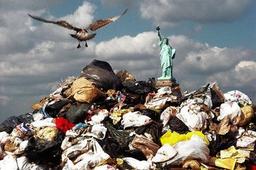
G7Int 3.6 America the Not-So-Beautiful (updated 2024)
Quiz by Janette Salinas
Feel free to use or edit a copy
includes Teacher and Student dashboards
Measure skillsfrom any curriculum
Tag the questions with any skills you have. Your dashboard will track each student's mastery of each skill.
- edit the questions
- save a copy for later
- start a class game
- automatically assign follow-up activities based on students’ scores
- assign as homework
- share a link with colleagues
- print as a bubble sheet
- Q1
What is the author's main purpose in writing this essay?
inform the reader of the problems of pollution in America
entertain the reader with anecdotes about his life
persuade the reader to do something about the pollution
express his hatred of pollution in modern America
30s - Q2
The title of this essay refers to the song “America, the Beautiful.” This is an example of what type of figurative language?
simile (it compares two things using like)
allusion (it makes a reference to something famous)
oxymoron (it combines contradictory things with opposite meanings)
metaphor (it compares two things using is)
30s - Q3
What is the tone of the last paragraph?
eerie
angry
serious
humorous
30s - Q4
What is the author’s main point in this essay?
Poor countries don’t have the same trash problems as more developed countries.
Insect and weed killers thrown away are likely to end up polluting lakes and rivers.
In 500 B.C., the Greeks passed the first law forbidding throwing trash in the street.
The “American Way” of throwing things out is creating major problems
30s - Q5
In "America the Not-So-Beautiful" the author claims that we are running out of space. How does he support this claim?
He supports this claim by reminding the reader that the ancient Greeks prohibited people from throwing their garbage in the street.
He supports this claim by stating that the American economic system is based on throwing things away and buying new ones.
He supports this claim by reminding us that we all have poison in our houses that we don't know what to do with.
He supports this claim by saying that we now have to build houses where dumps were.
30s - Q6
Who might benefit from reading "America the Not-So-Beautiful?"
Anyone, but especially Americans
Everyone, but not Americans
Only people who create landfills
Only chemical companies
30s - Q7
What is a landfill?
a place where planes landed
a place where land is filled
a place that is filled with trash
a place where trash is deposited
30s - Q8
A scale as used in the text refers to:
the size of something compared to something else
the comparison of a scale to a balance
a balance or something that weighs
30s - Q9
Which of these words matches the author's opinion about some Americans?
wasteful
watchful
willful
wrathful
30s - Q10
The author uses loaded language when he says:
The people of the city of New York throw away nine times their weight in garbage and junk every year.
Not only that, but Americans spend more for the packaging of food than all our farmers together make in income growing it. That's some statistic.
Some of the things we're throwing away are poisoning the Earth and will eventually poison all of us and all living things.
The more civilized a country is, the worse the trash problem is. Poor countries don't have the same problem because they don't have much to discard.
30s - Q11
How does the author connect the idea of prosperity to the amount of trash people throw away?
The author says that it is easier to throw things out when it is harder to replace them.
The author says that in countries that aren't prosperous, people must not hold on to things to get as little use out of them as possible.
The author says that it is harder to throw things out when it is easy to replace them.
The author says that because the United States has an abundance of things we want and need, we make more waste.
30s - Q12
In paragraph 4, the author says, “The more civilized a country is, the worse the trash problem.” What does he mean by “civilized” in this sentence?
the author means the very opposite of "barbarity", because he believes barbarians are the only ones who can make a trash problem worse
the author means “wealthy”, but it is used somewhat ironically because he argues in the same paragraph that civilized countries have a worse trash problem
the author means "polite and courteous"; someone who knows how to say "please" and "thank you", because he believes polite people do not contribute to the trash problem
30s - Q13
Rooney acknowledges that he is just as guilty as other Americans of heedlessly following the pattern of buying and throwing away.
truefalseTrue or False30s - Q14
Rooney's purpose is to convince wasteful Americans that their trash is not a problem yet but that they should cut back on their wastefulness before it is too late to save the planet.
falsetrueTrue or False30s - Q15
As readers, we can infer that Rooney cares about the future of our Earth and wants us to change our culture's wasteful ways and our relationship with the planet.
truefalseTrue or False30s